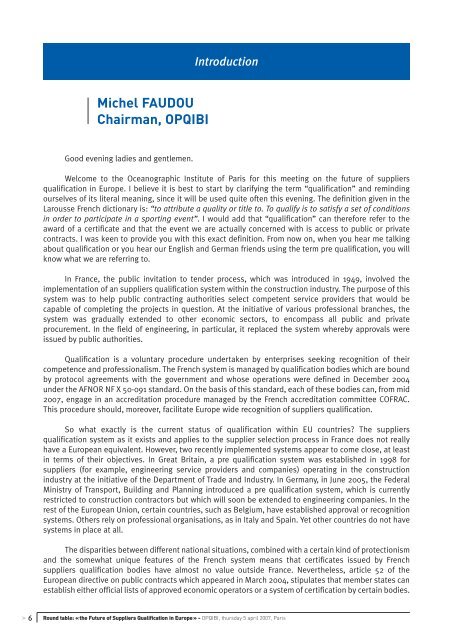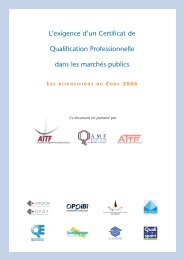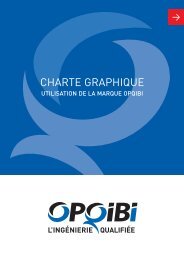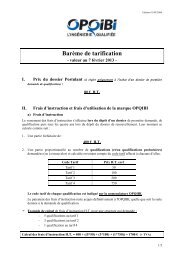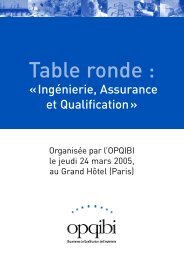Round table - Opqibi
Round table - Opqibi
Round table - Opqibi
You also want an ePaper? Increase the reach of your titles
YUMPU automatically turns print PDFs into web optimized ePapers that Google loves.
Introduction<br />
Michel FAUDOU<br />
Chairman, OPQIBI<br />
Good evening ladies and gentlemen.<br />
Welcome to the Oceanographic Institute of Paris for this meeting on the future of suppliers<br />
qualification in Europe. I believe it is best to start by clarifying the term “qualification” and reminding<br />
ourselves of its literal meaning, since it will be used quite often this evening. The definition given in the<br />
Larousse French dictionary is: “to attribute a quality or title to. To qualify is to satisfy a set of conditions<br />
in order to participate in a sporting event”. I would add that “qualification” can therefore refer to the<br />
award of a certificate and that the event we are actually concerned with is access to public or private<br />
contracts. I was keen to provide you with this exact definition. From now on, when you hear me talking<br />
about qualification or you hear our English and German friends using the term pre qualification, you will<br />
know what we are referring to.<br />
In France, the public invitation to tender process, which was introduced in 1949, involved the<br />
implementation of an suppliers qualification system within the construction industry. The purpose of this<br />
system was to help public contracting authorities select competent service providers that would be<br />
capable of completing the projects in question. At the initiative of various professional branches, the<br />
system was gradually extended to other economic sectors, to encompass all public and private<br />
procurement. In the field of engineering, in particular, it replaced the system whereby approvals were<br />
issued by public authorities.<br />
Qualification is a voluntary procedure undertaken by enterprises seeking recognition of their<br />
competence and professionalism. The French system is managed by qualification bodies which are bound<br />
by protocol agreements with the government and whose operations were defined in December 2004<br />
under the AFNOR NF X 50-091 standard. On the basis of this standard, each of these bodies can, from mid<br />
2007, engage in an accreditation procedure managed by the French accreditation committee COFRAC.<br />
This procedure should, moreover, facilitate Europe wide recognition of suppliers qualification.<br />
So what exactly is the current status of qualification within EU countries The suppliers<br />
qualification system as it exists and applies to the supplier selection process in France does not really<br />
have a European equivalent. However, two recently implemented systems appear to come close, at least<br />
in terms of their objectives. In Great Britain, a pre qualification system was established in 1998 for<br />
suppliers (for example, engineering service providers and companies) operating in the construction<br />
industry at the initiative of the Department of Trade and Industry. In Germany, in June 2005, the Federal<br />
Ministry of Transport, Building and Planning introduced a pre qualification system, which is currently<br />
restricted to construction contractors but which will soon be extended to engineering companies. In the<br />
rest of the European Union, certain countries, such as Belgium, have established approval or recognition<br />
systems. Others rely on professional organisations, as in Italy and Spain. Yet other countries do not have<br />
systems in place at all.<br />
The disparities between different national situations, combined with a certain kind of protectionism<br />
and the somewhat unique features of the French system means that certificates issued by French<br />
suppliers qualification bodies have almost no value outside France. Nevertheless, article 52 of the<br />
European directive on public contracts which appeared in March 2004, stipulates that member states can<br />
establish either official lists of approved economic operators or a system of certification by certain bodies.<br />
> 6 <strong>Round</strong> <strong>table</strong>: « the Future of Suppliers Qualification in Europe » - OPQIBI, thursday 5 april 2007, Paris


